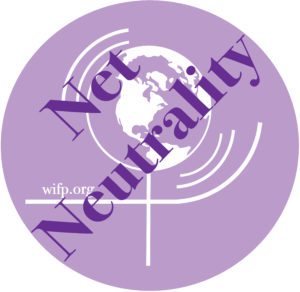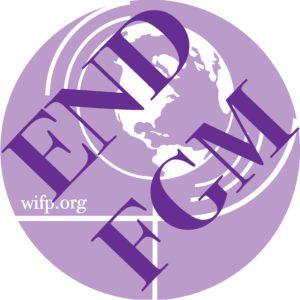WIFP Voices from Israel-Palestine
 Yaara and Abeer are currently participating in New Story Leadership program of 2015, which selects young emerging Israeli and Palestinian leaders and trains them into a team ready to help build a better future for their two communities. Ten students, five from Israel and five from Palestine, come to Washington DC every summer for an intensive program of workshops, conferences, seminars, professional work exposure, cultural immersion and team training. These two young ladies are interns in WIFP for the summer. They believe in the role of women to build a more stable and peaceful society. They also fight to be heard and to let women get the chance to express their inner voices without fear or any hesitation.
Yaara and Abeer are currently participating in New Story Leadership program of 2015, which selects young emerging Israeli and Palestinian leaders and trains them into a team ready to help build a better future for their two communities. Ten students, five from Israel and five from Palestine, come to Washington DC every summer for an intensive program of workshops, conferences, seminars, professional work exposure, cultural immersion and team training. These two young ladies are interns in WIFP for the summer. They believe in the role of women to build a more stable and peaceful society. They also fight to be heard and to let women get the chance to express their inner voices without fear or any hesitation.
Listening to the Other Side
A Music Teacher’s perspective on the Israeli-Palestinian Conflict
Yaara Elazari, 26, is International Relations and Music Education student in the Hebrew University of Jerusalem. Yaara is a flutist at heart, music teacher and a researcher in Israel’s Ministry of Foreign Affairs.
My story begins at a Kibbutz Eilon in northern Israel. My parents had a great love for hiking. I learned from them to appreciate nature and learned to love hiking. During those hikes, I came across recorders and flutes, which were played around campfires at night. I fell in love with the sound and started a lifelong affair with learning to play this beautiful instrument. For me, music has become a new language. I found out that the music is not only a language to express myself to my surroundings, but also a language that breaks barriers between people. Music is a deeper language than words, it speaks through the heart and to the soul, and allows me to express my feelings without words.
Let me give you an example of how I used the music when I became a young music teacher, just a year ago. I would go into a classroom and teach (Israeli) children a song, but not just any song, a song in Arabic. The children’s reactions were uncomfortable, they moved in their chairs a bit. These were the first Arabic words they had ever spoken in their life. But I repeated the song, and the melodies entered their ears, challenging their old assumptions, they would say: “I don’t like Arabs, but I like this song, can we sing it again?” or “Who is this singer, can we meet her?” Using the music as a method allowed a safe ground for conversations about Palestinians, Arabs, and different cultures. I allowed the kids to respond to the music, as well as express their feelings and thoughts while singing it.
After doing this for a year, I am convinced this is something amazing and very useful. The free world of music that contains no boundaries, no state, and no separation walls, introduced me to Arab music and Palestinian musicians. It was a bridge for me, and I built that bridge for others. 
New Story Leadership brought me to Washington and allowed me to meet with Palestinians. Last week, one of the Palestinian members, Ehab, told me something that sent me back to those classrooms. He said that meeting Israelis for the first time made him feel differently about his way of thinking and generalizing, and that he feels that when he goes back to Palestine, he will prefer to refer to Israelis as individuals. Now that he knows us, we do not fit in the group he created in his mind for Israelis. I could not agree more with, and I struggle to express the strength of the hope that fills my heart when I think of the change that can be made in each one of us.
The Jewish prayer, Mishna, says “Whoever destroys a soul destroys an entire world. And whoever saves a life, saves an entire world.” We are ten members, ten different worlds, which came here with the decision to save our worlds. Save it from ignorance, save it from the stifling stereotypes that limit our minds, and build a new one together.
In order to achieve our goals for listening to the other side, we need to find the comfortable zone for each person to do so. Music is a great assistant to me, and I intend to pass it on to others.
Do you know who you are?!
Identity is regarded as one of the most pressing problems for Arab Israelis. Many writers have written poems, articles and books about it. Arab Israelis, especially women, do not find themselves belonging purely to any certain group. Their voice faded away long time ago. It did the time they were convinced that the only thing they need to care about is surviving and they have no chance of fighting to express their voices or be who they are. They were, and still are, taught to pursue careers that are not related to the Conflict or to politics at all. I can very much relate to this and the story I am telling you has led to understand how crucial the problem of identity is for us.
“My name is Abeer Shehadeh, and I come from a Christian Arab family in northern Israel. I am a graduate of the University of Haifa in politics and English Literature and I am passionate about creative writing, which is what my project for change that I am working on now as part of my participation in New Story Leadership is about.” This is how I would introduce myself if someone asked me now to tell them a little bit about myself. Who you are should be an easy question to answer. However, sometimes it is not. 
In NSL, we believe in the power of our story to change the world and I will be writing briefly about my story.
My story is a bit different from other stories for the simple fact that it does not have a certain point where it started, and it definitely did not end yet. It is not located in a specific place or related to a specific time. In other words, it seems to be the story of a lifetime.
Growing up, I never questioned my identity. I know exactly who I am, even though I believe my interests or goals might change. But I have learned that most people do not care much about who I really am. Instead, they want to define me in terms of nationality and citizenship. My parents, being tolerant and liberal, have always taught me the value of love, forgiveness, understanding and respect. I grew up being totally naïve about the situation in my country. I believed that very soon, the conflict would be resolved. I believed that Israelis and Palestinians would understand that wars and violence are never the solution. I waited for this day like a kid waiting for Santa Claus on Christmas Eve.
At nineteen, I enrolled in the University of Haifa planning to get a degree in English literature and mathematics. I wanted to distance myself from politics because I believed that Israelis would never accept me. Then I met some Jewish students and really got to know them in my classes and extracurricular activities. My attitude changed. I decided to try taking an active part in social and political clubs at my university.
Then my moment of truth came at my first club meeting, where I was asked to define myself. I told them my story and they all stared at me. Then they asked: “But, wait a second, are you a Palestinian or an Israeli?” I froze. What should I say? Why do I have to choose? I never thought I would be labeled as a Palestinian or an Israeli. I have a national Israeli Identification and passport, but my family is Palestinian. I have just realized that I am in stuck in the middle of two opposing groups. After a long pause, I stammered: “I am both.” Then they froze. After some debate, I realized that in their minds, you cannot belong to both. I do not blame them, but now I understand that I should not wait for people to accept new possibilities. That day, my quest began to make this possibility come true.
Gandhi said: “Be the change that you wish to see in the world”, and this is what I decided to do. I might not be able to influence millions of people but I could definitely start with the people around me. That was a turning point in my life. I switched from mathematics to political science and philosophy. More importantly, I believed in myself and in what people my age can do to repair broken politics. I keep asking myself is this: Do we need a nation or a country to belong to? If yes, why don’t I, and many others, have this chance? If not, then why wouldn’t we all be considered as human beings, simply citizens of the world? Can we really consider ourselves as “citizens of the world”, or is it just a term used to avoid living with the complexity of our identity?
New Story Leadership (NSL): http://www.newstoryleadership.org
 The Women’s Institute for Freedom of the Press
The Women’s Institute for Freedom of the Press
